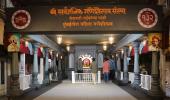Lokmanya Tilak lived a life replete with contradictions, although he modified many of his positions later in life.

Is it possible for a radical, anti-imperialist revolutionary to also be a social conservative who extols the virtues of the caste system, argues strongly that women and lower castes should not get the benefit of English education, and believes Muslims should not be considered Indians?
Bal Gangadhar Tilak, a well-known leader in the freedom movement from the extremist stream and among the triumvirate Lal-Bal-Pal, was one such.
He lived a life replete with contradictions, although he modified many of his positions later in life.
Vaibhav Purandare's book calls him the 'empire's biggest enemy'. But that's only part of the story.
The book itself is deeply researched and is endlessly fascinating. It is certainly not hagiography.
It is the exploration of the life of an individual who was deeply tormented by what he saw around him, appeared to have clung on to some ideas that afforded a sense of 'safety' of identity but was not afraid to call out and challenge the principal threat to freedom -- the British.
His rallying call: 'Swaraj is my birth right and I shall have it' is familiar to every schoolchild in India.
Mr Purandare covers ground already researched by several historians and social scientists.
An earlier book (2011) by Parimala Rao, for instance, explores Tilak as a man who was known as a radical revivalist and extremist, but who gained the support of dominant castes across Maharashtra because of his position on private moneylenders as well as marginalised groups asking for their share of public resources and basic human rights.
The focus of Mr Purandare's book is different. He delicately peels back the sophistication and complexity of Tilak's position on various issues and relates them to his life and times.
Tilak was born in 1856. Ten months later the 1857 revolt had India in its grips, followed by bloody reprisals by the British.
Emasculation -- of identity, religion, power -- was the dominant theme for Indians of the era.
Tilak and others like him argued that there was no trade-off between Hinduism and modernity.
But it was a package deal, and Hinduism had to be accepted with its warts, including caste.
He would until very late in life, take all his meals sitting on the floor; and always in a silk dhoti to denote purity.

The founding of the Indian National Congress in Bombay in 1885 and the All India Muslim League in Dhaka in 1906, were natural responses of a nation that was trying to find its political voice.
Tilak's call for Swaraj, Swadeshi and nationalist education, saw no contradiction between establishing a school -- the New English School -- where the medium of instruction was English but Sanskrit and Marathi were also taught compulsorily and his ideas of freedom.
Interestingly, his call for Home Rule coincided with the same call by Annie Besant a few months later.
Although the two struck up a working relationship and later even became friends, Besant exemplified, in many ways, what Tilak did not want Indian women to be: Blunt and outspoken.
Mr Purandare describes Tilak's trenchant criticism of Rukhmabai, who was married at 11 and when she turned 22, refused to live with her husband because he was a consumptive drunk.
The matter went to court in the case of the Age of Consent.
Tilak's logic was: How can the British tell us Indians, what the rights of an Indian woman should be?
Writing in the newspaper he founded, the Kesari, he said: 'If changes were to occur they must be systemic and gradual.'

But there are other aspects of Tilak's life that earned him the title of 'Lokmanya' or the one revered by the people.
The credit of transforming the Congress into a mass movement is usually given to Gandhi, and indeed he did.
But Mr Purandare's book reveals the foundations for this mass mobilisation to which Tilak contributed.
His two arrests: First in 1897 and later for six years leading to his banishment to Burma witnessed the first ever political strike by the working class.
The textile workers of Bombay, Hindus of all castes as well as Muslims, struck work for six days, one day for every year of the sentence.
Mr Purandare chronicles in great detail the proceedings of the trial for sedition that was the charge against Tilak.
But without doubt the most scintillating part of the book is the account of the extended negotiations between the Moderates and Extremists in the Congress; and the Lucknow Pact of 1916.
The 1907 Surat session of the Congress saw a split but Tilak returned to the Congress later.
How the return was negotiated is described in great detail by the author.

Equally interesting is Mr Purandare's judgement about Tilak's role in clinching the idea of separate electorates for Muslims with M A Jinnah as the co-signatory.
He writes: 'Those romantic about Hindu-Muslim togetherness point to his (Tilak's) endorsement of the pact... and those who see it as chimerical and purely dangerous with the benefit of hindsight... paint him as a sellout.'
But Mr Purandare says, the truth is that like most Indian nationalists Tilak was 'superbly buoyant' at this moment in Indian political life.
Bal Gangadhar Tilak died more than 100 years ago.
Among other things, he was a mathematician, grammarian and his Geeta Rahasya was a new interpretation of the book most Hindus consider the bedrock of the religion.
Many, like Savarkar, were inspired by him.
Some historians argue that the roots of Hindutva were laid by Tilak.
Mr Purandare's outstanding and balanced book reminds us that selective reading of history can lead to its distortion.
Feature Presentation: Aslam Hunani/Rediff.com











 © 2025
© 2025